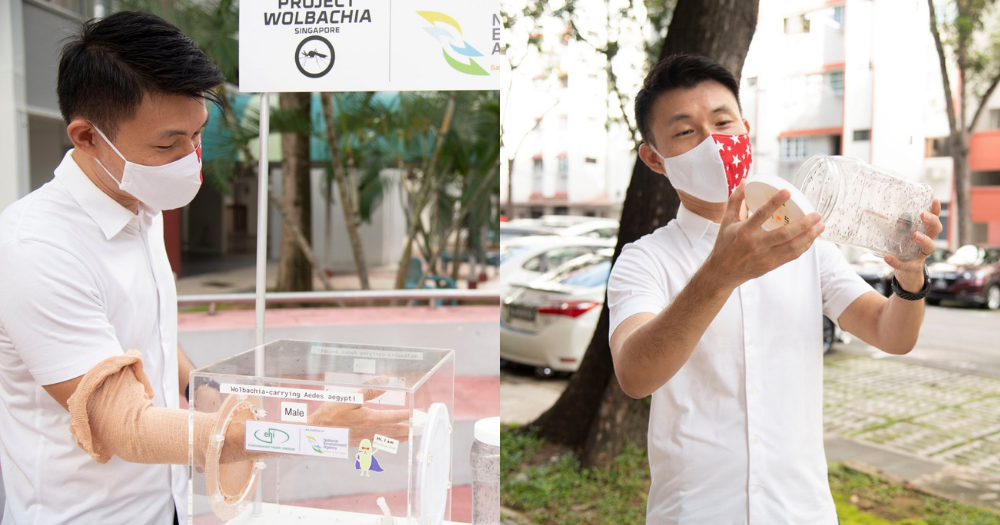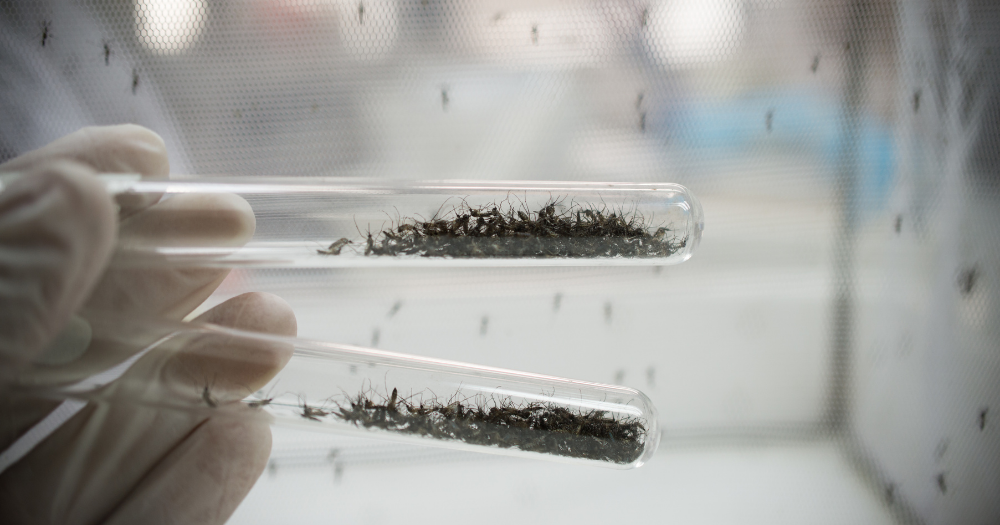Follow us on Telegram for the latest updates: https://t.me/mothershipsg
Based on the most recent data, the National Environment Agency (NEA) announced that Project Wolbachia has achieved up to 98 per cent suppression of the urban Aedes aegypti mosquito population.
Furthermore, the agency also observed 88 per cent fewer dengue cases at existing study sites with at least one year of releases.
The project, which has been going on for five years, releases male Wolbachia-Aedes mosquitoes to mate with blood-sucking female Aedes mosquitoes to render them or their offsprings infertile.
In Yishun and Tampines, releases of the male Wolbachia-Aedes mosquitoes have expanded from the initial 39 Housing & Development Board (HDB) blocks to 860 HDB blocks across both towns.
Releases are also done at dengue high-risk neighbourhoods at Choa Chu Kang and Bukit Batok, covering 207 HDB blocks where there have been consistently high Aedes aegypti mosquito populations.
 Baey Yam Keng at the first release of male Wolbachia-Aedes mosquitoes at Tampines North in December 2020. Photo by NEA Stop Dengue Now/Facebook.
Baey Yam Keng at the first release of male Wolbachia-Aedes mosquitoes at Tampines North in December 2020. Photo by NEA Stop Dengue Now/Facebook.
Very encouraging results
“This is the first time that the technology has been shown to be effective in suppressing Aedes mosquitoes and reducing dengue in a challenging tropical highly-urbanised and high-rise environment,” said Ng Lee Ching, Associate Professor and Group Director of Environmental Health Institute at NEA.
Typically, traps set out by NEA would catch 50 or more mosquitoes per 100 traps per week.
In most areas within the study sites, the number of mosquitoes caught dropped to less than 10 mosquitoes after a few months of releases.
Positive spillover effects were also observed in areas around the release sites.
“The exciting results suggest that if Wolbachia technology is properly implemented alongside surveillance and community-based removal of Aedes mosquito breeding habitats, Singapore could potentially be the first dengue endemic country in the world to effectively control this epidemic disease”, said Duane Gubler, Dengue Expert Advisory Panel Chairman and Emeritus Professor at Duke-NUS Medical School, Singapore.
Expansion of project to include Marine Parade and selected construction sites
NEA has announced that more releases will be done in selected residential estates and construction sites within study sites in the fourth quarter of this year.
According to NEA, by covering different terrains and landscapes, "The aim is to test different strategies to determine the most effective and impactful approaches for future wider scale deployment for Project Wolbachia in Singapore."
By the first quarter of 2022, releases at Tampines and Yishun will be expanded to cover 686 and 769 HDB blocks respectively. About 60 per cent of the blocks were already covered as of May 1.
High-risk areas within Choa Chu Kang and Bukit Batok towns will also be covered by the end of this year.
The study sites will also expand to include the Marine Parade landed estate area. NEA has been engaging residents and recruiting volunteers to host mosquito traps in their homes for mosquito surveillance.
Photo via Getty Images
If you like what you read, follow us on Facebook, Instagram, Twitter and Telegram to get the latest updates.

